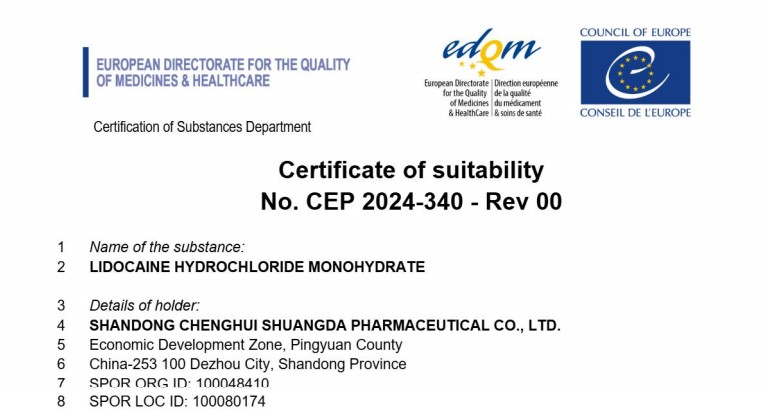On November 10, 2025, our company successfully obtained approval for the European CEP registration of our active pharmaceutical ingredient (API), Lidocaine Hydrochloride. We have received the Certificate of Suitability to the European Pharmacopoeia (CEP certificate) issued by the European Directorate for the Quality of Medicines & HealthCare (EDQM).

We submitted the CEP application for Lidocaine Hydrochloride to the EDQM in July 2024 and secured this approval in November 2025. This marks the fifth CEP certificate granted to our company this year. Our company has already submitted registration applications for multiple products in various countries, including those in Europe and the US, with several having received approval. In the future, we will continue expanding international registration efforts for more of our products.
This achievement serves as a new milestone for us. We remain committed to strengthening our foundations, driving innovation, focusing on present goals, and pioneering future advancements! We are confident that more of our products will successfully pass international registrations, boosting our API business development and creating new opportunities in the global competitive landscape.
Product Profile
English Name: Lidocaine Hydrochloride
- English Chemical Name: 2-(Diethylamino)-N-(2,6-dimethylphenyl)acetamide hydrochloride monohydrate
- CAS No.: 6108-05-0
- Molecular Formula: C₁₄H₂₂N₂O·HCl·H₂O
- Molecular Weight: 288.82 g/mol
- Application Overview: Lidocaine Hydrochloride is an amide-type local anesthetic. It stabilizes nerve cells by blocking the ionic flow required for the generation and conduction of nerve impulses, thereby producing local anesthesia. Following systemic absorption or intravenous administration, it exhibits distinct biphasic effects—excitation followed by depression—on the central nervous system; analgesia and drowsiness may occur even without initial excitation at lower blood concentrations, leading to an elevated pain threshold. For individuals allergic to procaine or benzocaine, lidocaine hydrochloride offers a relatively safer alternative. Additionally, it functions as a Class IB antiarrhythmic agent.

